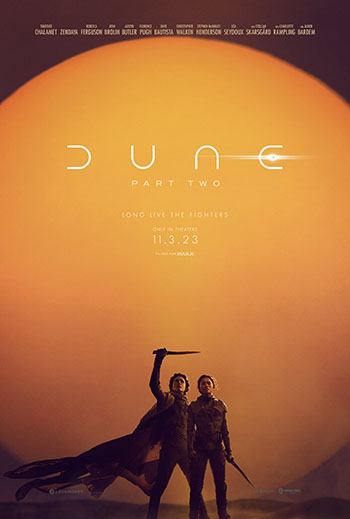Movies

New Releases • A-D • E-H • I-P • Q-Z • Articles • Festivals • Interviews • Dark Knight • Indiana Jones • John Wick • MCU
Dune, starring Timothée Chalamet and Zendaya, directed by Denis Villeneuve
Trailer: Warner Bros.
Dune (2021)
Directed by Denis Villeneuve
Rated PG-13
Ambushed 22 October 2021
#DuneMovie • #IMAX
The presentation is as hot as the Arrakis mid-day sun, but Dune’s story is still as cold as the desert night.
The Year 10191

The unfilmable has been filmed. Again.
Once upon a time, Dune, Frank Herbert’s immersive novel, was deemed unfilmable. The documentary Jodorowsky’s Dune details a failed attempt in the mid-1970s, one with a production book of designs and concepts that is said to have been the source for a multitude of movies, including Star Wars and Alien.
Then there was David Lynch’s 1984 curiosity piece that — to some, sacrilegiously — tinkered with the ending. It was Lynch’s first movie in full living color after establishing himself as a fringe artist working exclusively in black-and-white. An extended cut was so awful, Lynch had his name removed and directing credit was delegated to the legendary (and non-existent) Alan Smithee.
That was followed by a TV mini-series starring William Hurt as Duke Leto in 2000. It was successful enough to yield a new first for Dune: the filming of a sequel, Children of Dune.
Now, it’s director Denis Villeneuve’s turn and optimism has been running high leading up to the movie’s release — delayed an entire year because of COVID. That confidence is displayed in the opening frames. It’s not just Dune. It’s Dune: Part One.
And that’s not an in-movie chapter reference. That’s putting it out there right here, right now that this one’s going to be a blockbuster that kicks off the Dune franchise. Part Two is already in pre-production, along with a TV series (Dune: The Sisterhood) in the pipeline.
There’s certainly a wealth of material out there, with six novels in the official Frank Herbert canon, plus nine more in the extended series written by his son Brian and Kevin Anderson.
Spice Pirates
But the problem today is the exact same one faced by Lynch 37 years ago: Dune — while technically “filmable” now — is still a mighty tough nut to crack narratively. It’s a cold, burdensome, plodding story. A lot of this impenetrable tale surrounds mystic witches grooming a messiah and the plotting of warring factions within an organization called the Spacing Guild (think of all the flak George Lucas received for the political maneuverings he loaded into Star Wars: Episodes I-III).
To the credit of this version’s screenwriters, with Villeneuve joined by scribes experienced in the art of the adaptation, Jon Spaihts (Doctor Strange) and Eric Roth (Forrest Gump), they’ve managed to cut through the bulk of the turgidity and get to the core of the setup, making it much more straightforward and accessible than Lynch’s interpretation.
They also ditched all the inner dialoguing that Lynch used to try to fill the gaps in all the character introductions, thoughts, lingo, technology and concepts.
This is ultimately the story of a super-being, a people and culture called the Fremen and a nasty adversary in House Harkonnen, jealous of and determined to destroy House Atreides. But Paul Atriedes (Timothée Chalamet, The French Dispatch) is that messianic figure and House Harkonnen picked the wrong family at the wrong time while trying to exert universal domination.
Central to all this is the planet Arrakis, also known as Dune. It’s a harsh planet, a Tatooine without the cozy dive bars. But it produces a spice that is central to the Fremen way of life. It’s a hallucinogen, a lifeline and an essential element in space travel. In short, “he who controls the spice controls the universe.”
House Harkonnen had hoped to sabotage House Atreides while passing the stewardship of Arrakis over to Duke Leto (Oscar Isaac, Star Wars: The Force Awakens), but they overlooked the possibilities of Paul’s destiny and underestimated the size of the oppressed Fremen population.
The Hero’s Journey
As with Lynch’s version, there’s a lot to admire on the visual side. So many cool vehicles and spacecraft, richly detailed costumes, expansive landscapes. The use of location filming helps to make this Dune universe feel more “real.” And, if it’s to be seen at all, it should most certainly be seen on the largest screen possible. The IMAX presentation offers spectacular sound and strong imagery and, as an experiential bonus, some scenes were shot in the extra-large format.
Villeneuve — who took on the equally daunting task of helming Blade Runner 2049 — certainly has an eye for the cinematic and he’s adept at building out entire worlds. His challenge is in generating energy and pulling out the emotional core to make this dense story resonate with the masses, not just the prebuilt fanbases surrounding Villeneuve and Herbert. It is, after all, the emotional connection with the characters which largely drove the wild success of series like Star Wars and The Lord of the Rings.
Amid all the dream sequences, religious intonations, Middle Eastern cultural appropriations and political mechanics, there’s no room to simply break loose and explore the worlds of the Dune series. Villeneuve doesn’t generate a sense of adventure — although it most certainly is an adventure for young Paul, who’s never experienced space travel before and never left the friendly confines of House Atreides on the oceanic planet Caladan.
But that’s another problem with the material. Paul should be the conduit for the audience to share in the confusion, the excitement, the adventure. But when the central character that’s crucial to building a relationship with the audience (like Luke Skywalker, for example) is a know-it-all, it’s a mighty tough row to hoe. Paul is a messiah and he’s hard to relate to, even for some of us burdened with a messiah complex. Paul already knows everything there is to know about Dune. He instinctively knows how to properly setup and wear a stillsuit, a Fremen invention used to capture body moisture and sustain life for extended periods while exposed to Dune’s brutal elements.
Use the Voice, Paul
The great cast offers quite a few similarities between the Lynch and Villeneuve productions, but Paul is certainly one of the standouts in terms of creative differences. Kyle McLachlan’s Paul was a confident and handsome prince. Impeccable in almost every way. Chalamet’s version is scrawnier, less self-assured and much more disheveled. He is in so many ways a typical teenager, aside from the messianic thing, of course.
Absent altogether in this version (which ends with Paul meeting Chani and joining the Fremen) is Princess Irulan, as is Feyd-Rautha (notably played by Sting in the Lynch version, with Mick Jagger cast in the squelched Jodorowsky project). Perhaps thankfully, this version also lacks the Jabba-like slug in a vat that was the Guild Navigator in Lynch’s version.
Villeneuve taps into a rich vein of talent for the casting and leverages all the latest in special effects technology, but even so, even with the progress made in making the story more accessible, Dune still lacks a crucial hook and without it, finding mass appeal will be a mighty feat, not unlike finding a rainstorm on Arrakis.
• A slightly edited version was originally published at MovieHabit.com.



